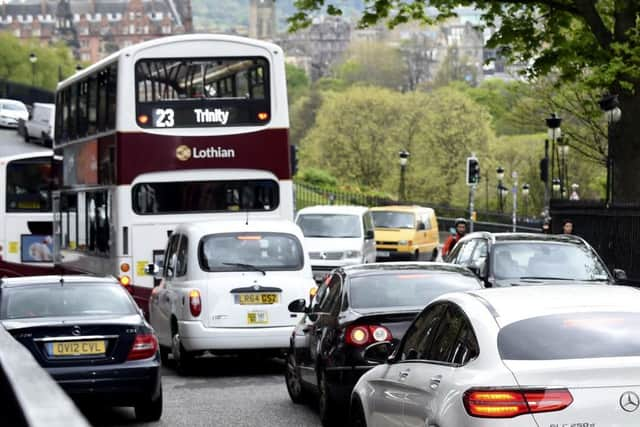Cars as new as five years old could be banned in Edinburgh
Instead of covering just a central area, the Capital’s Low Emission Zone (LEZ) is proposed to extend to the entire city.
The zone would permit only diesel vehicles with Euro 6 engines, which were introduced five years ago, and petrol cars with Euro 4 engines, introduced in 2005. And the restrictions would apply to private cars along with buses, lorries and other vehicles.
Advertisement
Hide AdAdvertisement
Hide AdOnly around half the vehicles in the city are thought to currently meet the required standards.


Transport convener Lesley Macinnes said the move would bring major health benefits. But critics described the proposals as “drastic” and warned that they would hit the poorest hardest.
City motorists also raised concerns about the impact of the proposed ban.
The zone is expected to be established by the end of 2020, but it is not clear how the requirements would be phased in.
Councillor Macinnes promised consultation, but said: “This is not a whim, but based on evidence. It would result in a better quality of life for the city – a healthier city with less pollution.
“It would deliver a much better city for children to grow up in, older people to grow old in, and for people to visit and commute sustainably in.
“If you have an older car, we will be asking you not to come into the city, or pay an enormous fine.
“We know this is going to demand a lot of change from people, but let’s look at the benefits. The minute you link it to health outcomes and people realise the benefits.”
Advertisement
Hide AdAdvertisement
Hide AdAlmost every new car sold since September 2015 has been Euro 6 compliant, while 2013 and 2014 models of certain popular vehicles, including the Volkswagen Golf, Ford Focus and BMW 5-series also meet the standards.
Euro 4 petrol engines set similar goals for vehicle emissions, banning any new registrations from 1 January, 2006 onwards from producing more than the limit.
City Tory group leader Iain Whyte said targeting pollution hot-spots would be better than a blanket approach.
And he said: “Particularly in relation to diesel cars, if they have to be post-2014 that means an awful lot of people who have paid large sums of money for vehicles – and who thought they were doing the right thing – would be left having to change their car.”
Liberal Democrat councillor Kevin Lang said Edinburgh faced an air quality crisis with places like Queensferry Road among the worst polluted streets in Scotland.
“We desperately need urgent action to tackle this and an LEZ has a part to play, but it is important that is part of a wider plan that includes significant improvements in public transport.
“If you are looking to limit private vehicle use, you need to provide viable alternatives.”
But he backed the whole city approach. “If you only have an LEZ in certain streets, the risk is you push the problem to somewhere else.”
Advertisement
Hide AdAdvertisement
Hide AdGlasgow city centre became Scotland’s first LEZ in January, with 20 per cent of buses required to meet the emission standards, as a first step. The proportion will steadily increase to cover all buses – and other vehicles – by the end of 2022.
Aberdeen and Dundee are also due to create zones by the end of next year.
Greens supported the idea of a city-wide LEZ. Councillor Gavin Corbett said: “Almost every day new evidence emerges of the need for radical action on the climate emergency and on local air pollution.
“The big questions are not if we should make this happen but how we can make it happen”
Environmental campaigners Friends of the Earth Scotland also welcomed the move.
The proposal emerged as roads in the centre of Edinburgh were closed to traffic for the first time as the city joined the worldwide Open Streets movement to reduce air pollution.
Pedestrians and cyclists were able to enjoy exploring the historic Old Town which was shut to motorised vehicles between midday and 5pm yesterday. The Open Streets initiative has seen cities around the world temporarily opening streets to people by closing them to cars, vans and other vehicles on a regular basis.
Open Streets in Edinburgh will take place on the first Sunday of every month as part of an 18-month trial.